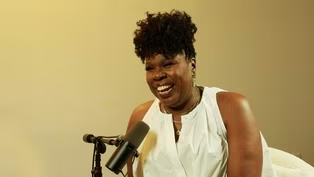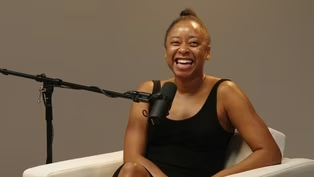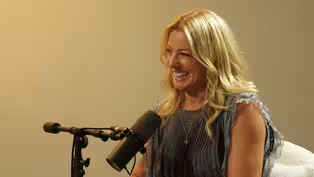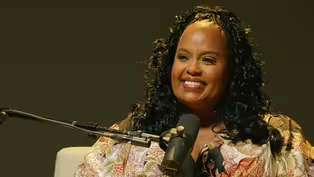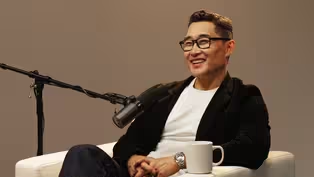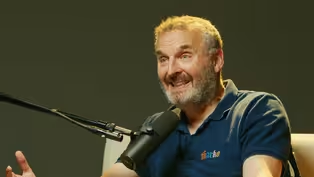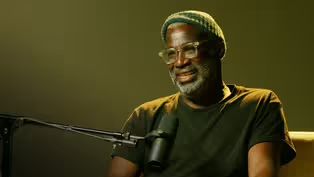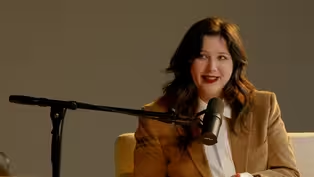
Daveed Diggs Takes on Cyberpunk Rap
Special | 25m 28sVideo has Closed Captions
Rapper and actor Daveed Diggs on his creative process as a rapper and songwriter.
Rapper and actor Daveed Diggs on his creative process as a rapper and songwriter. The "Hamilton" actor discusses his hip-hop group, clipping., and their new cyberpunk album, "Dead Channel Sky."
Problems playing video? | Closed Captioning Feedback
Problems playing video? | Closed Captioning Feedback
Support for American Masters is provided by the Corporation for Public Broadcasting, AARP, Rosalind P. Walter Foundation, Judith and Burton Resnick, Blanche and Hayward Cirker Charitable Lead Annuity Trust, Koo...

Daveed Diggs Takes on Cyberpunk Rap
Special | 25m 28sVideo has Closed Captions
Rapper and actor Daveed Diggs on his creative process as a rapper and songwriter. The "Hamilton" actor discusses his hip-hop group, clipping., and their new cyberpunk album, "Dead Channel Sky."
Problems playing video? | Closed Captioning Feedback
How to Watch American Masters
American Masters is available to stream on pbs.org and the free PBS App, available on iPhone, Apple TV, Android TV, Android smartphones, Amazon Fire TV, Amazon Fire Tablet, Roku, Samsung Smart TV, and Vizio.
Buy Now
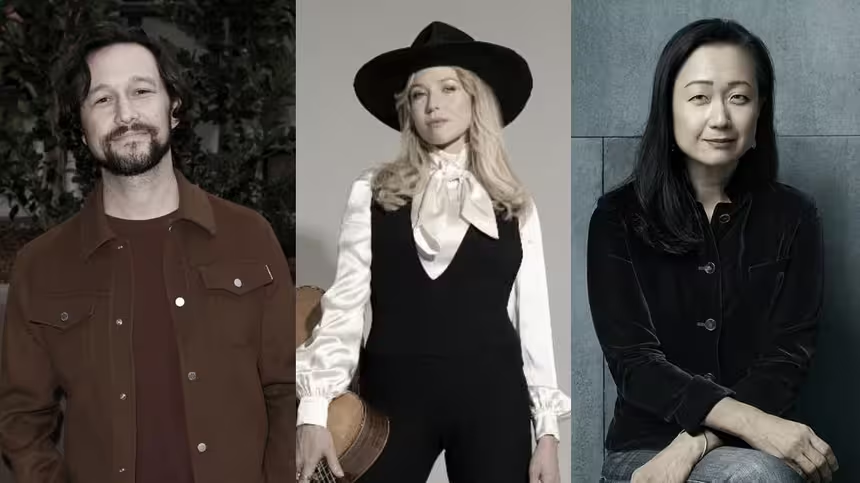
A front row seat to the creative process
How do today’s masters create their art? Each episode an artist reveals how they brought their creative work to life. Hear from artists across disciplines, like actor Joseph Gordon-Levitt, singer-songwriter Jewel, author Min Jin Lee, and more on our podcast "American Masters: Creative Spark."Providing Support for PBS.org
Learn Moreabout PBS online sponsorshipMore from This Collection
How do today’s masters create their art? "Creative Spark" presents narrative interviews that go in-depth with an iconic artist about the creation of a single work. Each episode offers a unique window into the world of art and the creative process of artists and cultural icons across a wide range of disciplines, from music and comedy to poetry and film.
How Leslie Jones Became a Comedian
Video has Closed Captions
Comedian and actress Leslie Jones does a deep dive on her creative process. (31m)
Phoebe Robinson Shows Her Work
Video has Closed Captions
Comedian Phoebe Robinson takes on hustle-culture in biting comedy special. (31m 45s)
Sarah McLachlan: Making Music to Connect and Heal
Video has Closed Captions
Singer-songwriter Sarah McLachlan opens up in a candid interview about making music. (37m 19s)
How Natasha Rothwell’s Life Brought Her to “The White Lotus”
Video has Closed Captions
Actress Natasha Rothwell on her creative process in "The White Lotus." (33m 40s)
Daniel Dae Kim Leads Spy Drama and Fights for Industry Change
Video has Closed Captions
Actor Daniel Dae Kim on his groundbreaking career and new project, "Butterfly." (21m 48s)
Phil Rosenthal’s Secret Recipe: Good Food and a Laugh
Video has Closed Captions
TV writer and host Phil Rosenthal talks about finding our shared humanity in food and comedy. (22m 53s)
Tunde Adebimpe Channels His DIY Roots Into Raw Solo Debut
Video has Closed Captions
Musician Tunde Adebimpe on his creative process behind his solo album debut. (37m 28s)
Lucy Dacus Makes Her First Loves Songs
Video has Closed Captions
Singer-songwriter Lucy Dacus talks about love songs for her new album, "Forever is a Feeling." (23m 49s)
Providing Support for PBS.org
Learn Moreabout PBS online sponsorship(soft electronic music) - I'm curious how cyberpunk connects and is in conversation with culture today.
- A lot of the genre was about what technology gives us and what it takes away from us, and who controls it, right?
And the more we begin to rely on technology, how does that just become or not become a tool for capitalism to do what capitalism does?
And then, where are the people fighting back against that?
Where's the revolution in that?
Yeah, I mean, in going back to a lot of this literature and a lot of these movies, a lot of what they were talking about feels like now, actually, it's just not cool.
It's not sexy, (laughing) it's not, it being in the middle of it feels pretty mundane.
But look at this dumb watch I'm wearing, this is a cyberpunk thing.
(Joe chuckling) This Apple watch that's reading my pulse and transmitting that to a doctor if necessary.
And like, and where I can look up directions on it and talk on it, getting a phone call on your wrist was a cyberpunk thing!
Like that was a, you know?
(Joe chuckling) This is the future and it's just not that cool, right?
I'm embarrassed that I'm wearing it.
I forgot to take it off before this and now it's on camera?
And like that embarrasses me.
And maybe you just don't know you're in the apocalypse, right?
Maybe you're in the middle!
Maybe we're not pre-apocalypse or post apocalypse.
Maybe this is just apocalypse.
(both chuckling) And this is what it feels like, and there's no one, it doesn't look like "Mad Max" out there, we're not all, like, no one's sitting on the front of my car with a guitar playing my theme song for Valhalla.
It's like not, it's just this.
The genre did inform the nature of this record a lot, and kind of make us want to present an alternate present that feels cool, that like still where we can listen to these songs and feel cool if we're listening to them.
And like, I don't know, (laughing) I'm also in my forties.
Like, right, like maybe (Joe chuckling) someone who wasn't alive reading stuff, and watching movies in the early '90s, like still is able to feel cool about right now.
- Right.
(laughing) (Daveed laughing) (sharp electronic music) (soft electronic music) - Hi, I'm Joe Skinner!
And this is "American Masters Creative Spark."
In each episode, our guest breaks down their creative journey behind a single work of art.
Today, I spoke with actor and rapper Daveed Diggs about his experimental hip hop group, Clipping, and their new cyberpunk-inspired album, "Dead Channel Sky."
♪ Calling all cyber rap race escape artists ♪ ♪ To the clearing ♪ ♪ Near ye how the synth wind whispers ♪ ♪ As endearing as the Jack Tom past ♪ ♪ You've all run from ♪ ♪ Down in the doldrums grabbing hold as if a dungeon ♪ ♪ Guess they say ♪ - What you're hearing is one of the singles from that album, called "Welcome Home Warrior," featuring Daveed Diggs rapping as a computer hacker in a cyberpunk collab with another rap legend, Aesop Rock.
♪ Ten-hup ten ton tuffy in the Red-rum, Red-rum ♪ ♪ Punk's not dead but rebel to rebel ♪ ♪ I'm bell rung and out-radicaled ♪ ♪ Help me to the breadcrumbs, make it look natural ♪ - Daveed Diggs is a rapper who often exceeds well over a hundred words per minute with his high speed delivery and complex writing.
(intense electronic music) ♪ You know this is where you must belong ♪ ♪ Listen to your arteries ♪ ♪ Don't the chambers that echo out this song ♪ ♪ It's a part of you ♪ ♪ Even though you've been a part too long ♪ ♪ It's been calling you ♪ ♪ Just answer the call ♪ ♪ And all the rest of it will follow you ♪ ♪ Wrap yourself in all of you ♪ ♪ And in time, time will honor all you do ♪ ♪ Welcome home, warrior, everyone is proud of you ♪ ♪ Welcome home warrior, everyone is proud of you ♪ (fuzzing music) - You might recognize him more from his acting credits though, especially his dual role as Lafayette and Jefferson and "Hamilton."
But to understand how Daveed got here, you need to understand how music was in his DNA from the start.
Going back to his days hearing music in his crib in the early 1980s.
- My mom was a DJ before I came along in the '80s and early '80s.
And my dad was also a great lover of music.
And so, we had this huge record collection growing up.
So, music was always around.
Parliament is my favorite band of all time, Parliament, Funkadelic, and George Clinton is the gold standard to be in terms of like music.
But that I discovered that stuff as a kid.
Apparently, Atomic Dog was my favorite song in 1982, it's the same year that song came out.
And I was born in January of that year, and like, apparently in my crib, that was my favorite song.
(Joe chuckling) - We also had seven dogs at the time, so I would imagine anything with barking on it (Joe chuckling) probably was something I was drawn to.
♪ Bow-wow-wow, yippie-yo, yippie-yay ♪ ♪ Bow-wow-wow, yippie-yo, yippie-yay ♪ ♪ Bow-wow-wow, yippie-yo, yippie-yay ♪ ♪ Bow-wow-wow, yippie-yo, yippie-yay ♪ - But as I started discovering rap music, that was mine, right?
That was something that my parents didn't introduce me to, that came, I remember like I'd heard one of the songs from the Black Sheep album, I think some kid was playing it in a tape tag, and I asked my mom if I like to buy me that, I remember.
(funky music) ♪ You can get with this, or you can get with that ♪ ♪ You can get with this, or you can get with that ♪ ♪ You can get with this, or you can get with that ♪ ♪ I think you'll get with this, for this is where it's at ♪ - But Black Sheep was an East Coast duo.
And it wasn't until Daveed got deep into Regional Bay Area music that he started to really find his voice.
And he couldn't find it alone.
Clipping is a trio that consists of Daveed and producers Jonathan Snipes and William Hutson who give Clipping their abrasive, textured sound and rich atmosphere.
And William Hutson and Daveed actually knew each other since grade school, discovering music together.
- As me and Bill were growing up together and we started going to the record stores, and we started being around rappers, because the Bay Area has always had a really vibrant music scene, but the thing about it is, and this is with most arts in the Bay, like there's not really an industry for any of it there, but there are a lot of people doing it.
So, you're always surrounded by artists who are also teachers or whatever, and that's the kind of thing I grew up around.
So, I remember Del the Funky Homosapien lived down the street from my mom's house, and I just see him on his razor scooter all the time.
But yeah, I remember Bill had the second freestyle fellowship album, "Innercity Griots."
(soft music) He had that at night.
He was the first person who played me a copy of that.
And I don't know, it couldn't have been long after it came out.
I remember hearing that and being like, "Oh, whoa."
And that sending me down this spiral of like LA underground stuff, (soft music intensifies) and all of the like, things that sort of leaned closer to free jazz than rap music.
(jazz music) ♪ Once we have the knowledge of self ♪ ♪ As a people then we could be free ♪ ♪ And no devil could ever enter the boundaries ♪ ♪ I stand in the center around all these sounds I see ♪ ♪ Blessin' Allah that I found the key ♪ ♪ That's how we be ♪ - All the Project Blowed stuff ended up becoming really important to me.
♪ That snaps so quick or the raps so sick or the absolutely ♪ ♪ Put together each and every link ♪ ♪ And get me cosmically in sync ♪ (lips smacking) - And Haiku d'Etat, that like super group they performed for a little while.
♪ With the Mike, Aaron and Eddie ♪ ♪ Mike Mike Mike, Aaron and Eddie ♪ ♪ Mike Mike, Aaron - n - n - n - n - n - n - n - ♪ ♪ Aaron and Eddie ♪ (airy music) - But at the same time in the Bay, like the Mystik Journeymen were happening.
♪ Think about the present and the past times ♪ ♪ Reflect on your life and the bad times ♪ (airy music) - And also, I started playing the saxophone when I was nine years old.
Like, I end up going to Berkeley High School, and I'm starting to find Ornette Coleman, and all like free jazz stuff that I wouldn't have maybe come my way before.
And so, all of this kind of leading towards the more like experimental side of most genres is like kind of for me, just part of the like Bay Area soup.
Yeah, for me, like being a kid who was interested in art and having a ton of access to artists.
'Cause there was a big arts community there, but not really having access to the commercial side of making art?
Like led me to this, I think contributed a lot to what I ended up being, which is like I only know how to make things that feel this way, and I don't really know how to make something in order for it to sell well.
(Joe chuckling) Right?
(laughing) I don't have any good idea of how to do that in any of the things that I do, so I really have to trust other people (laughing) when they say that they can make some money off (beeping).
'Cause I have no idea how to do it.
'Cause I didn't have a motto for that!
I didn't know anybody, it was really, but we did have all of these cats around, just, it was all hustle!
All of these hustle, everyone's hustling all the time, in order to just, that to me was just what being an artist is.
And so, yeah.
So, I think all that sort of Bay Area kind of indie spirit soup is what kind of equals somebody who teams up with some similar friends and makes a thing like Clipping, and like the "Hamilton" of it all too!
Like those, I knew those cats for years and years, we were just weirdos freestyling together in front of people.
But like it was, yeah, it all feels very Bay Area to me.
(Joe chuckling) - People think of "Hamilton" now as this huge financial success obviously on Broadway, but to hear that it has these roots in something that's so sort of the groundswell of just indie spirit, I think is really cool.
- Yeah!
Yeah!
I'm in that because me and Anthony Veneziale who's another member of Freestyle of Supreme, were called to substitute teach the same class due to a clerical error.
This is in 2000 and, (Joe chuckling) I don't know, 5 or 6 or something, yeah, right?
Like, that's how I got involved with those guys.
And he was like, "Hey, my friends also rap and act.
(both laughing) We should hang out and do that together."
- So, what's the lesson there, you know?
- I don't know, man, just keep making stuff with your friends!
I do, I talk to a lot of like college kids and stuff.
And I always say, if for the artists, like, you're collaborators, you're like greatest collaborators, the people you have the most success with, you're probably sitting next to them right now.
Like, you're probably already doing it for all of us in the arts particularly.
But I think kind of everyone, we are taught to feel that like there is something greater out there.
That like the next step is the step.
Like, oh, I'm right, I just need to do this and then I'm on, right?
And I just, I don't know, I think it took me a long time to get really comfortable with, and I still have to remind myself, but to get really comfortable with just looking around, just laterally instead of forward all the time.
Like, what's right here?
'Cause like.
(soothing music) Yeah, we all like devalue the things that are right around us all the time, right?
I guess the grass is always greener, right?
But yeah, there's so much to be mined from your immediate community, I think.
- Through connections that came out of the Bay Area's indie spirit soup, Daveed Diggs ended up going from substitute teaching to winning Grammy and Tony Awards for his work on Broadway's "Hamilton."
He was recruited for his highly technical rapping, a skill he honed through his work with Clipping, drawing inspiration from rappers like Aesop Rock and Bay Area icon, and E-40.
- I mean, E-40 is my favorite rapper of all time, he's in everything I write, but specifically, as it relates to us, there's a sort of ease, there's a conversational nature to even the most complicated things that he's trying to do, I think the great trick of rap music when it's done right, it's my favorite thing about it is you imagine that the person you're listening to just talks like that.
♪ I be more hipper than a hippopotamus ♪ ♪ Get off in your head like a neurologist ♪ ♪ Pushin' more weight than Atlas ♪ ♪ Got a partner by the name of 2Pacalypse ♪ - And my job, because I'm a rapper, like is kind of wonderful 'cause I get to borrow from everything.
And so, Aesop Rock is on this album.
He is all of our favorite rapper pro, I mean really up there on the list, but definitely in the DNA of this band is that fearlessness lyrically to be obtuse or to take a really simple phrase or image and complicate it?
(fuzzy electronic music) ♪ Smells like drywall, whisper of black mold ♪ ♪ Subtle hint of light bulb ♪ ♪ Sunk into the sofa, blowing kisses on a dice roll ♪ ♪ Roll dice like a flying kick to your side-scroll ♪ - In the previous four full length albums that Clipping released, they were defined by this complicated and obtuse lyrical storytelling, always told in second or third person.
But they were usually influenced by the horror genre.
And here with their new album "Dead Channel Sky," the title itself is a reference to the opening line of William Gibson's novel, "Neuromancer."
So, they're clearly embracing a new genre, cyberpunk.
- All three of us are fans of that genre.
And we're just genre people in general, the things we consume are genre things, and a lot of our records are sort of skewed that way, and it was one we hadn't played in before.
And the music is so fun, like sonically deciding to reference a genre that really had its heyday in the '80s and '90s, and that we associate with films like "The Matrix" or "Blade."
In a time when there was a lot of really, like marketing-based attempts at sort of crossing over like techno and IDM, and electronic music, and rap music, right?
And rock music and all of these things, like the soundtracks to these films were just throwing a bunch of stuff, a bunch of popular things in a blender, and being like, "Huh?"
(Joe chuckling) You know, isn't this what the kids are into?
And most of it is terrible and some of it's great.
So that kind of just got us to talking, and we start just throwing out ideas, and this is how it goes generally.
And then, we start going down various rabbit holes, oh, what is it shouldn't, what are the different novels we wanna reference?
Oh, we really like this thing from.
There's a lot of great slang in "Neuromancer" we should use.
So yeah, they come from all over the place, but once we start spinning out on a concept, we just kind of attack it from all sides, and we just keep saying things.
And eventually, there's this big pile of stuff, (electronic music) and we sort of sift through it.
And what comes out is a bunch of songs that hopefully add up to an album.
(chuckling) - On the album notes, "Dead Channel Sky" is described as "The Twin Suns of hip hop and cyberpunk, merging together in mapping their twin histories from the '80s and '90s to create a fictional alternate present."
You can hear it right out of the gate, in the album's second track, "Dominator."
♪ Once again back, it's the incredible ♪ ♪ Guess the feeling wasn't indelible ♪ ♪ Masticated up all the edibles ♪ ♪ Still ain't trippin' ♪ ♪ Apathy had to make out-of-body the status quo ♪ ♪ Avatar opportunity is creating the capital ♪ ♪ And no cap, audiences are infinitely more valuable ♪ ♪ When they thinking they ugly, inactive, fat ♪ ♪ And unfashionable, kill yourself ♪ - The album is a conceptual mixtape of disparate but connected tracks that offer a glimpse into this alternate universe.
I really love this concept of the new album being like a compilation CD that's found (Daveed chuckling) in the dust bin in the future.
- Yeah.
(chuckling) - Could you expand upon that idea a little bit?
- Yeah, yeah.
Again, from like, if you used to go to record stores, there was always the bargain bin or like the dollar bin, or everything had whatever, a different colored sticker on it, and it was all marked down to like a dollar, and it was stuff nobody wanted.
And we would comb through that stuff, hey, because I didn't have a lot of money.
And you could buy something 'cause it had a cool cover, or because you hadn't heard of anything on it before.
And that was a big part of how we found new things.
And I think we wanted all of these songs to exist in the same universe, but not necessarily be told from a single perspective.
And so, the reference point for that was like a compilation CD or a soundtrack to a film, right?
Or something where everyone's playing in the same sandbox, all of these artists exist at the same time.
In this case, they all happen to have my voice too, which is a little jarring.
(Joe chuckling) But they don't necessarily have anything to do with each other outside of that.
And so, what sort of picture of a universe do we paint with like a bunch of different artists who have all been kind of just, who are just donating a song to this compilation.
So, we have something like "Change the Channel," which obviously, sonically is referencing The Prodigy, but that song is from the perspective of somebody who's a soldier in a war.
And one of the things we decided was that there are many wars going on in the present of this record.
But unless you are in the middle of them, you're not necessarily experiencing it at all, which is kind of how wars happen now.
(graphics whooshing) ♪ Change the channel ♪ ♪ The waves are making your face hurt ♪ ♪ Make the most of it ♪ ♪ Short days in the basement ♪ ♪ Rebar in the nail bed ♪ ♪ Breast milk in a green vial ♪ ♪ Wet sheets in the corner ♪ ♪ Asbestos is best before breakfast ♪ - The whole hype is they don't know what they're fighting for, but they are fighting, and they have a series of tasks that need to be completed, and they're completing them.
♪ Catch your breath, gas can at the ready ♪ ♪ Lighter on the floor ♪ ♪ Drops of sweat glisten ♪ ♪ Listen closely, everything is very important ♪ - So there's that, but that person does not necessarily exist as the same person who wrote "Polaroids," who is just a person looking through a box of photographs, kind of remembering things and trying to piece together how they got wherever they are right now.
(electronic music) ♪ Don't bother with it, live lobotomy ♪ ♪ Split the bottle better ♪ ♪ Drink to God and leave the past behind for the fire ♪ ♪ Don't nobody want these polaroids ♪ - Or certainly "Mirrorshades pt.
2" on this record with our friends Cartel Madrass on it, which is just like a club song, and about how cool it must be in this club that you can't get into unless you have the right attire.
(electronic music) ♪ 'Round here you wear your mirrorshades ♪ ♪ You cool with that?
♪ ♪ Mirrorshades ♪ ♪ 'Round here they wear their mirrorshades ♪ - And then we always, the last song, "Ask What Happened," we've decided at some point that that's the song from the person who's responsible for the compilation, (laughing) because there's a lot of trying to tie up loose ends on it.
There's a lot of trying to make it all make sense.
And also, he's kind of like, the perspective of that one is sort of like a heady, like backpack real tight conscious rapper.
The kind that we grew up on, but that we don't often play in that sandbox in this band either, so it was fun to do that, and it's fun to think of that song as being from that person.
(suspenseful music) ♪ Okay ♪ ♪ Thumbs up for the bombs dropped ♪ ♪ With the resource runnin' low, killing many okay ♪ ♪ Safe harbour instead of off-shore for the rich ♪ ♪ If you got money you will be okay ♪ ♪ Stock markets never stop anymore ♪ ♪ People locked on the floor trading all day ♪ ♪ Farmers stop when the crops are worth less than land ♪ ♪ That they start selling away ♪ ♪ Internet entering into homes via phones online ♪ ♪ Is a thing they say ♪ ♪ Speed-up thought is a boon for communication ♪ ♪ Borders break when they link for trade ♪ ♪ Allies made to be safe ♪ ♪ And to maintain status currency in play ♪ ♪ Tech is king in the life of the ring ♪ ♪ To the table is changing, things you pay for ♪ - Wow, there's so many characters that you get to dive into.
I mean, that just reminds me of the acting process in a way too.
I think there's a pretty fine line between acting and writing in that way, and do you find that as well?
- Yeah, I mean maybe more so on this one than on others of our stuff, but yeah.
I mean, the great thing about writing is that you get to play every character.
When I'm writing screenplays or whatever, that's the fun part, is while I'm writing it, it's all me, and then we're gonna give it to somebody to do it much better.
But so yeah!
Yeah, this band is funny, and that there is character, but it feels more novelistic I guess?
It feels, yeah, it feels more, I've never written a novel, so I also probably don't know what I'm talking about, but (chuckling) it's closer to what I imagine writing a novel is like than what I happen to know acting is like, or writing a screenplay is like.
Because it's about how do you give clues to a bigger story?
How do you select language and circumstance that, yeah, that add up to more than just what they're saying, and try to create a whole world out of these very small snippets.
These would be primary sources for your book report about 2025 in 1991, right?
Or whatever.
(laughing) - Mm-hmm.
- These were things that like, you went to the future and found these sort of songs.
Like, that's often what we think we're trying to do is create clues to a much greater existence without describing the whole existence.
- There is this big resurgence, I would say in the past 5, 10 years around sci-fi and science fiction.
Part of me thinks it's because there's like a yearning for analog synthesis, and there is a yearning for those older eras.
- Yeah!
I think that's right, I think.
Bill said this not too long ago that, "Every song is an artifact," right?
Once you record something, like that's how recorded music worked, it was recorded at a place and a time, and every sound on that (soft music) record is about, is actually like a time capsule of that time.
So, (clears throat) for us, for this record going back, and like mining synths that were used in the '80s and '90s, and trying to get those real sounds, like there is a kind of archeology there that's happening, and these are songs, they're gonna, they're like generally pretty frivolous, you're gonna listen to them a couple times or a ton of times or not, you're going to be listening to them, however you're listening to them, certainly not in like a perfect listening situation, 'cause who has that?
And very, very few people.
So, what they are are just recorded evidence of whatever we were thinking at the moment that that song (chuckling) was made or the moments.
And then, you get these albums that exist that are from a particular time, and those become time capsules of like that time.
And sometimes, when you group those together with a bunch of other things that came out at that time, you get, "Oh," That kind of anthropology is like, "Oh, this is what we felt like in this era."
These are the kinds of things we were thinking about.
And these are the kinds of sounds, especially when you talk about popular music or dance music or whatever, things that are meant to be played with people in places.
These are the kinds of sounds that used to mean that then.
And that to me is really interesting.
(ambient music)
Support for PBS provided by:
Support for American Masters is provided by the Corporation for Public Broadcasting, AARP, Rosalind P. Walter Foundation, Judith and Burton Resnick, Blanche and Hayward Cirker Charitable Lead Annuity Trust, Koo...

